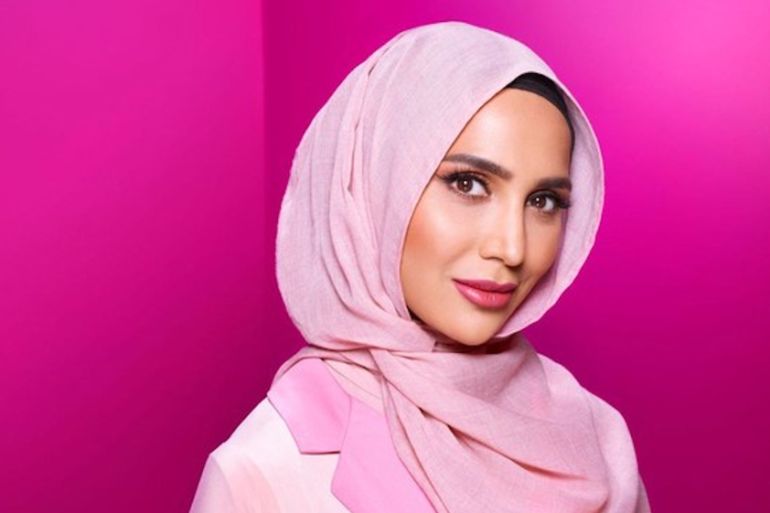L’Oreal does not celebrate diversity
Muslim women are only allowed in to the white world of beauty if they accept to toe the line.

British beauty blogger Amena Khan announced that she has pulled out of L’Oreal’s latest haircare campaign, after a series of tweets in which she criticised Israel in 2014 re-surfaced.
In a statement, Khan explained that she withdrew from the campaign – a move that L’Oreal said it agrees with – because the conversations surrounding her tweets “detract from the positive and inclusive sentiment that [the L’Oreal campaign] set out to deliver”.
The L’Oreal haircare campaign, which purported to celebrate diversity, quickly made headlines for featuring the hijabi model in a hair product advertisement.
The campaign was supposed to be part of the company’s strategy to champion diversity. L’Oreal has pledged to “explore and reflect the infinite diversity of styles, habits and expressions of beauty across the world in order to effectively develop and market products most adapted to diversity”.
But L’Oreal’s leadership is seemingly oblivious to what diversity actually means. Trotting out people of colour in front of a camera is not diversity, despite what Matt Damon might think. If a company intends to value the diverse make-up of a society, then it must accept that people with different life experiences will have distinctive views.
Producing skin-whitening creams and airbrushing advertisements to the point that they have to be banned don’t really help diversity image-building efforts. And neither does suspending contracts over expression of certain political views.
In September 2017, L’Oreal ended its cooperation with transgender model Munroe Bergdorf for her comments on race and racism. In the wake of white supremacist violence in Charlottesville, Bergdorf wrote in a post on Facebook about the “racial violence of white people […] Yes ALL white people”.
She later clarified that she intended to highlight the institutional and social prioritisation of white people. L’Oreal, instead of considering her diverse viewpoint, ended her contract and tweeted that it “champions diversity“.
That L’Oreal seeks a controlled form of diversity is unsurprising. Muslims and hijabis have only been permitted space in media campaigns in recent years because they are considered de jour, alternatively fashionable and fresh.
There has been a hijabi Playboy photoshoot, a hijabi Barbie doll, and a modest fashion line in Debenhams, a British high-street retailer. Khan was given space on the L’Oreal campaign because of the heads she would turn, not because the company’s leadership has altruistic do-gooders or because they actually place any value on diversity.
Views that get you in trouble and views that don’t
Apart from pulling out of L’Oreal’s campaign, Khan also apologised for her tweets, which many claim was unnecessary and even amounted to self-censorship.
Two of her tweets, which she posted during the 2014 Gaza war, have attracted the most criticism: “Israel is a sinister state & the ones who suffer most are innocent children” and “Israel= Pharoah [sic]. Both are child murderers. Insha’Allah, defeat also awaits the former; it’s only a matter of time. #HopeForGaza #SaveGaza”.
Many of Khan’s supporters have pointed out that, around the same time, Israeli actress Gal Gadot posted a message of support for the Israeli army on social media:
“I am sending my love and prayers to my fellow Israeli citizens. Especially to all the boys and girls who are risking their lives protecting my country against the horrific acts conducted by Hamas, who are hiding like cowards behind women and children…We shall overcome!!! Shabbat Shalom! #weareright #freegazafromhamas #stopterror #coexistance #loveidf”.
But while Khan was criticised for her comments, Gadot has been celebrated as a feminist icon for starring in the Hollywood production “Wonder Woman”.
The truth is that, in today’s world, Palestine is a dirty word that will get you discredited, blacklisted, lambasted in public, and kicked off campaigns.
Khan’s statements were mild in comparison to statements from Israel’s public supporters. In August 2014, American comedian Joan Rivers said the following about the Palestinians and the Gaza war: “You started it. We now don’t count who’s dead. You’re dead, you deserve to be dead. Don’t you dare make me feel bad about that.”
But Rivers’ public standing did not suffer, despite the extreme and violent nature of her statements. Khan’s statements also pale in comparison to comments tweeted by American talk show host Bill Maher at around the same time, in which he compared Hamas to “a crazy woman who’s trying to kill u – u can only hold her wrists so long before you have to slap her”.
His statement should also call into question Maher’s attitude towards women. But while Khan was denounced for her comments, Maher continues his work, unscathed and unapologetic.
All of the above comments were made during the Gaza war of 2014, in which over 2,200 Palestinians were killed, including nearly 500 children. Six Israeli civilians, including one child, were killed, as well as 66 Israeli soldiers.
The controversy surrounding Khan’s tweets and L’Oreal’s response to the issue is telling. Muslim women are only allowed into the white beauty industry if we rid ourselves of our experiences, of our opinions and of our beliefs.
This is not a campaign that accepts diversity, and the participation of minorities in the beauty world is always on terms determined by the decision-makers of the majority.
L’Oreal, because you’re worth it … so long as you toe the line.
The views expressed in this article are the author’s own and do not necessarily reflect Al Jazeera’s editorial stance.
